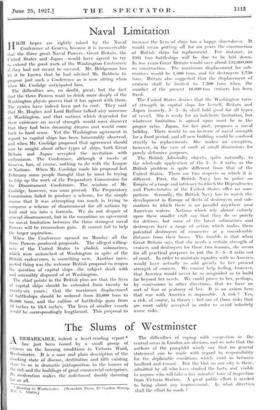Naval Limitation
HIGH hopes are rightly raised by the Naval Conference at Geneva, because it. is inconceivable that the three great Naval Powers—Great Britain, the United States and Japan—would have agreed to try to extend the good work of the Washington Conference if they had not meant to succeed. Mr. Bridgeman has let it be known that he had advised Mr. Baldwin to propose just such 'a Conference as is now sitting when when Mr. Coolidge anticipated him. The difficulties are, no doubt, great, but the fact that the-three PoWers want to drink more deeply of the Washington physic pros-es that it has agreed with them. The cynics have indeed been put to rout. They said that Mr. Hughes and Lord Balfour talked airy nonsense at Washington, and that nations which depended for their existence on naval strength would soon discover that they had been dreaming dreams and would come hack to hard-sense. Yet the Washington agreement in regard to capital ships has been that observed, and when Mr. Coolidge proposed that agreement should now be sought about other types of ships, both Great Britain and Japan accepted the invitation with enthusiasm. The Conference, although it meets at Geneva, has, of course, nothing to do with the League of Nations. When Mr. Coolidge made his proposal last February some people thought that he must be trying to trip up the work of the Preparatory Commission for the Disarmament Conference. The wisdom of Mr. Coolidge, however, was soon proved. The Preparatory Commission failed to produce a scheme, for the simple reason that it was attempting too much in trying to compress a scheme of disarmament for all nations by land and sea into a formula. We do not despair of general disarmament, but in the meantime an agreement for naval limitation between the three strongest naval Powers will be tremendous gain. It cannot fail to help the larger aspiration.
When the Conference opened on Monday all the three Powers produced proposals. The alleged willing- ness of the United States to abolish submarines, which were untouched at Washington in spite of the British endeavours, is something new. Another unex- pected thing was the welcome British proposal to reopen the question of capital ships—the subject dealt with and ostensibly disposed of at Washington.
The chief points in the British plan are that the lives of capital ships should be extended from twenty to twenty-six years ; that the maximum -displacement of battleships should be reduced from 35,000 tons to 30,000 tons, and the calibre of battleship guns from 16 inches to 18.5 inches. The lives of smaller vessels would be correspondingly lengthened. This proposal to increase the lives of ships has a happy shrewdness. It would mean putting off for six years the construction of British ships for replacement. For instance, in 1931 two battleships will be due to be laid down. In ten years Great Britain would save about £42,000,000 on construction. The maximum displacement for sub- marines would be 1,600 tons, and for destroyers 1,750 tons. Britain also suggested that the displacement of cruisers shall be limited to 7,500 tons when the number of the present 10,000-ton cruisers has been fixed.
The United States desires that the Washington ratio of strength in capital ships for herself, Britain and Japan (namely, 5-5-3) shall hold good for all types of vessel. She is ready for an indefinite limitation, but whatever limitation is agreed upon must be in the proper ratio. Japan, for her part, proposes a naval holiday. There would be no increase of naval strength for a fixed period, and all new building would be confined strictly to replacements. She makes an exception, however, in the case of craft of small dimensions for purely defensive purposes.
The British Admiralty objects, quite naturally, to the wholesale application of the 5-5-3 ratio, as the British problem is quite different from that of the United States. There arc two respects in which it is different. First, the British Navy has to police an Empire of a range and intricacy to which the Dependencies and Protectorates of the United States offer no com- parison. Secondly, the British Navy has to watch the development in Europe of fleets of destroyers and sub- marines to which there is no parallel anywhere near American waters. Nations which rely almost entirely upon these smaller craft say that they do so purely for defence, but some of the latest submarines and dCstroyers have a range of action which makes them potential destroyers of commerce at a considerable distance from their bases. The trouble is that when Great Britain says that she needs a certain strength of cruisers and destroyers for these two reasons, she seems. for all practical purposes to put the 5-5-3 ratio out of court. In order to maintain equality with us America would have actually to add greatly to her present strength of cruisers. We cannot help feeling, however, that America would never be so misguided as to build far beyond her needs. We could prove to her, perhaps, by concessions in other directions, that we have no sort of fear or jealousy of her. It is an axiom here that war with America is impossible. A risk ? Yes, a risk, of course, in theory ; but one of those risks that are most safely accepted in order to avoid infinitely worse risks.














































 Previous page
Previous page